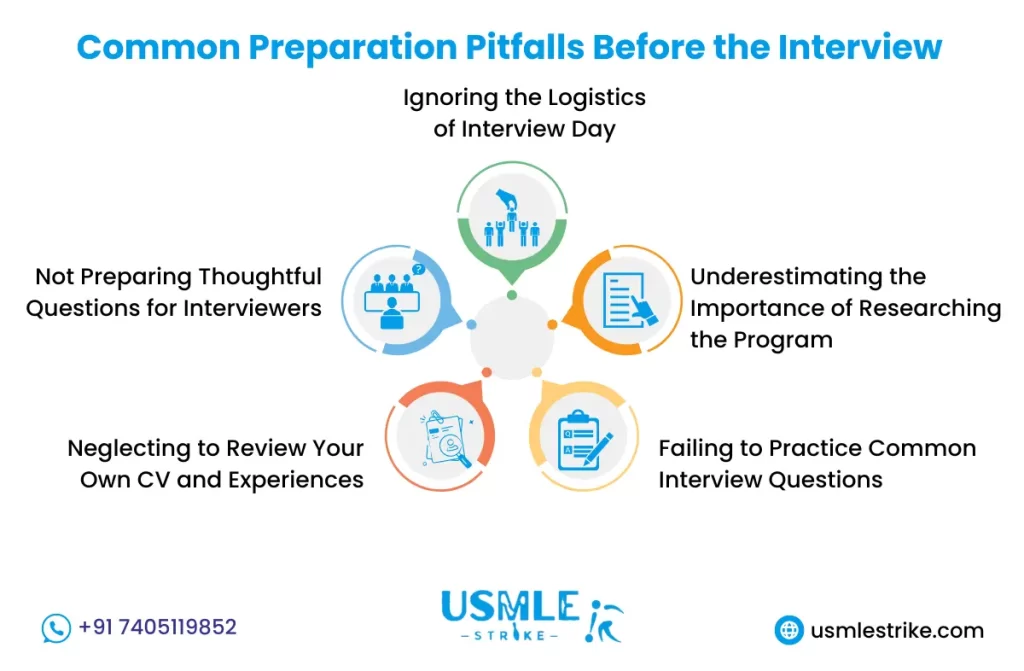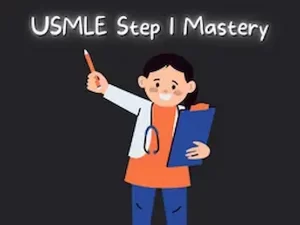Securing a medical residency in the U.S. through the USMLE process is a significant milestone for every aspiring doctor. One of the final steps in this journey is the residency interview, a crucial opportunity to make a lasting impression on the program directors. However, many applicants unknowingly make mistakes that could harm their chances of being accepted. In this post explore, we’ll explore Residency Interview Mistakes to Avoid, focusing on the common pitfalls, do’s and don’ts, and essential tips for success.
The residency interview is a vital component of the USMLE journey, and many candidates fall short due to preventable errors. Understanding the Residency Interview Mistakes to Avoid can help you make a positive and lasting impression. From preparation to follow-up, this post will guide you through common interview mistakes and what you should do to avoid them.

Common Residency Interview Mistakes to Avoid
Many candidates make similar errors that could easily be prevented. Let’s take a look at some Common Interview Mistakes and how you can avoid them.
Lack of Preparation
One of the most Common Interview Mistakes is showing up to the interview underprepared. Residency program directors expect you to have a solid understanding of the program, its culture, and its strengths. Without preparation, you may seem uninterested or uncommitted, which can leave a bad impression.
How to avoid this mistake:
- Research the program thoroughly. Understand the specialties, the faculty, and any notable accomplishments.
- Be ready to answer questions about why you want to join that specific program.
- Practice your responses to common residency interview questions with friends, family, or a mentor.
Poor Communication Skills
Clear communication is essential in medical practice, and your ability to articulate your thoughts during the interview is critical. A lack of confidence, using too much medical jargon, or being overly verbose are Residency Interview Mistakes to Avoid that could reflect poorly on your interpersonal skills.
How to avoid this mistake:
- Practice answering questions clearly and concisely. Stick to a structure, such as stating your answer, giving an example, and concluding your response.
- Avoid rambling. It’s better to deliver a short, focused answer than a long-winded, unclear one.
Being Overconfident or Arrogant
Confidence is key, but there’s a fine line between being confident and coming across as arrogant. Overselling your accomplishments, interrupting the interviewer, or appearing dismissive of the program’s challenges are some of the most Common Interview Mistakes to avoid.
How to avoid this mistake:
- Show humility while speaking about your achievements. Acknowledge the importance of teamwork and collaboration in your success.
- Avoid interrupting the interviewer and be respectful in your responses.
- Focus on how you can contribute to the program while being open to learning and growth.
15 Residency Interview Mistakes That May Sink Your Chances
Avoid these common interview mistakes to improve your chances of success in your residency interview:
- Arriving Late: Punctuality reflects your professionalism. Always arrive early.
- Being Too Humble: Don’t downplay your accomplishments. Highlight your strengths confidently.
- Rambling Answers: Keep your answers concise and to the point.
- Failure to Research the Program: Know details about the program and its specialties.
- Speaking Negatively About Others: Always maintain a professional and positive attitude.
- Not Asking Questions: Prepare thoughtful questions that demonstrate genuine interest.
- Forgetting to Smile: Smile and engage warmly to make a positive impression.
- Poor Body Language: Maintain good posture and eye contact throughout the interview.
- Inappropriate Attire: Dress professionally; avoid casual or overly flashy outfits.
- Talking About Salary Too Early: Focus on the program, not financial discussions.
- Not Showing Enthusiasm: Lack of passion may signal disinterest in the program.
- Dodging Questions About Weaknesses: Be honest and self-aware in discussing areas for improvement.
- Not Sending a Thank-You Note: Always follow up with a personalized thank-you note after the interview.
Avoiding these residency interview mistakes can significantly improve your chances of being selected.
Do’s and Don’ts of Residency Interviews
Now that we’ve covered some Residency Interview Mistakes to Avoid, let’s explore the Do’s and Don’ts of Residency Interviews. Following these tips will help you navigate the process more effectively.
Do’s
- Do Research the Program: As mentioned earlier, program research is vital. Knowing the program’s strengths and showing how your skills align with them will make you stand out.
- Do Ask Questions: Always come prepared with thoughtful questions for the interviewer. This shows your interest and that you’ve taken the time to understand the program.
- Do Practice Your Responses: Whether it’s your introduction or answering why you want to specialize in a certain field, practice makes perfect. Record yourself, practice in front of others, and work on your delivery.
- Do Be on Time: Punctuality shows respect for the interviewer’s time. Make sure you’re early for the interview to avoid rushing.
Don’ts
- Don’t Badmouth Other Programs: One of the key Residency Interview Mistakes to Avoid is speaking negatively about other programs or your previous experiences. It can make you appear unprofessional.
- Don’t Appear Disinterested: Fidgeting, avoiding eye contact, or appearing distracted are all signs of disinterest. Be attentive and engaged throughout the interview.
- Don’t Lie or Exaggerate: Fabricating achievements or exaggerating your skills may seem like a quick way to impress, but it can backfire. Honesty is always the best policy.
- Don’t Forget to Follow Up: Failing to send a thank-you note after your interview is another Common Interview Mistake. A well-written follow-up email can reinforce your interest in the program.
Don’t Ask Questions to Which You Should Already Know the Answers
One of the biggest residency interview mistakes to avoid is asking questions that reflect poor preparation. Before your interview, thoroughly research the program. Don’t ask about basic details, such as how many residents are in the program or what the core rotations are, as this information is typically available online.
- Examples of Bad Questions:
- “How many residents are in the program?” (should be easily found on the program’s website)
- “What are the core specialties here?”
Instead, ask thoughtful questions that show your enthusiasm and curiosity about the program’s values and future plans. This will help you stand out and avoid common interview mistakes.
Best Practices for Residency Interviews
To avoid Residency Interview Mistakes, consider these best practices as part of your overall strategy.
Show Professionalism
Professionalism during the interview goes beyond just wearing the right attire. It includes your body language, tone of voice, and how you handle questions. Being late, using inappropriate language, or showing a lack of enthusiasm are Residency Interview Mistakes to Avoid at all costs.
- Maintain Eye Contact: This shows confidence and attentiveness.
- Dress Appropriately: Opt for formal and professional attire.
- Stay Engaged: Actively listen to the interviewer and respond thoughtfully.
Personalize Your Responses
While it’s essential to practice responses to common questions, you don’t want to sound too rehearsed. It’s important to customize your answers to each program and align them with the values and goals of the residency.
- Tailor Your Answers: Highlight what makes the program special and how you will contribute to its success.
- Use Real-Life Examples: Whenever possible, provide specific examples from your experiences to back up your points.
Be Honest About Your Challenges
If asked about challenges you’ve faced, don’t hesitate to share your experiences, but be honest. Many candidates make the mistake of avoiding this question altogether or providing a vague answer, which can make them seem disingenuous.
- Acknowledge Your Weaknesses: Be upfront about areas where you’ve struggled and explain how you’re working to improve.
- Frame it Positively: Show how you’ve grown from the challenges you’ve encountered.
How to Handle Difficult Questions in Residency Interviews
Another key aspect of avoiding Residency Interview Mistakes is knowing how to handle tough questions. Residency interviews often include challenging questions to assess your problem-solving and interpersonal skills.
Stay Calm and Composed
It’s easy to get flustered if you’re asked a question you weren’t expecting, but remaining calm is essential. Taking a deep breath and pausing before answering can help you gather your thoughts and avoid one of the Common Interview Mistakes—panicking and providing an incomplete or unclear response.
Clarify If Needed
If you’re unsure about the context of the question, ask for clarification. Many candidates fall into the trap of making assumptions about the question and providing the wrong answer, which is one of the Residency Interview Mistakes to Avoid.
Questions to Avoid Asking Your Interviewer
When preparing for a residency interview, it’s essential to ask thoughtful, relevant questions that demonstrate your interest in the program. However, there are certain types of questions you should avoid asking your interviewer:
- Salary and Benefits: Avoid asking about salary, vacation time, or benefits early in the process. These details will be discussed later and asking too soon can make you seem focused on perks rather than the opportunity.
- Questions Easily Found Online: Don’t ask questions about information readily available on the program’s website, like the size of the program or basic curriculum details.
- Personal Questions: Avoid overly personal questions about the interviewer’s life or career decisions unless they offer it first.
- Negative or Critical Questions: Don’t ask questions that might seem negative, such as “What don’t you like about the program?” These can put the interviewer in an uncomfortable position.
Mistakes You Don’t Want to Make
Some residency interview mistakes to avoid are less obvious but equally damaging:
- Overly rehearsed answers: While preparation is key, over-rehearsed answers can come off as robotic.
- Interrupting the interviewer: Always listen carefully and avoid cutting off the interviewer mid-sentence.
- Bringing up unrelated topics: Keep your answers relevant to the medical field and the program’s specialties.
- Over-explaining weaknesses: Be succinct when discussing any shortcomings; focus on how you’re improving them.
- Failing to express your unique fit: Be clear about why you are a great match for the specific program.
By avoiding these subtle but important mistakes, you’ll enhance your performance and avoid sinking your chances during the interview process.
Conclusion
Understanding the Residency Interview Mistakes to Avoid is critical for any candidate aiming to secure a residency position. By preparing thoroughly, practicing communication skills, and following the do’s and don’ts of residency interviews, you can avoid common pitfalls and present yourself as a confident, well-prepared applicant. Good luck with your residency interviews! If you have any further questions or need additional guidance, feel free to reach out for more support.
Read also: What to Wear for Residency Interview





